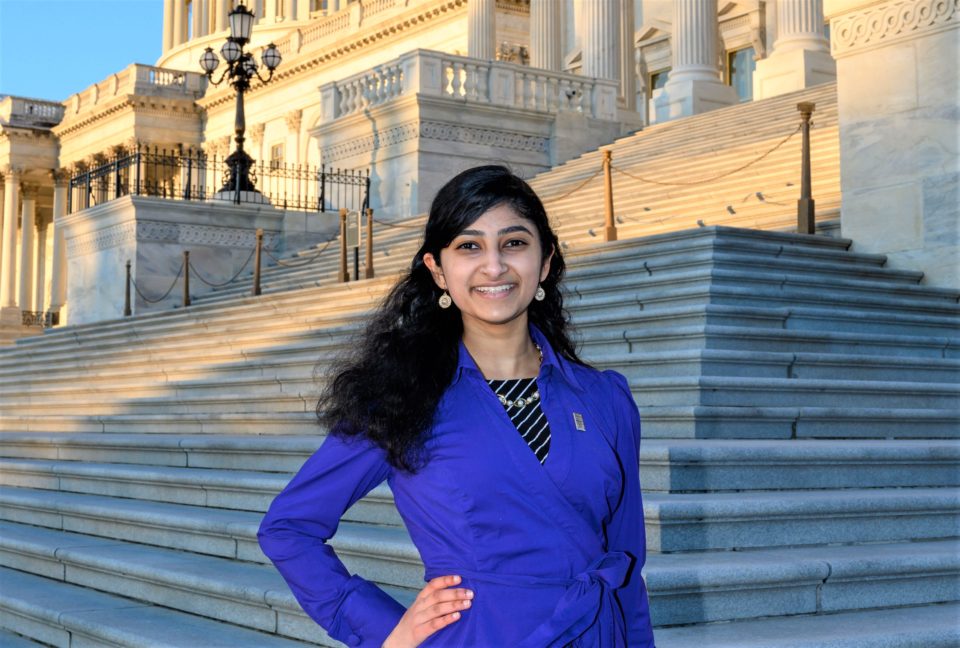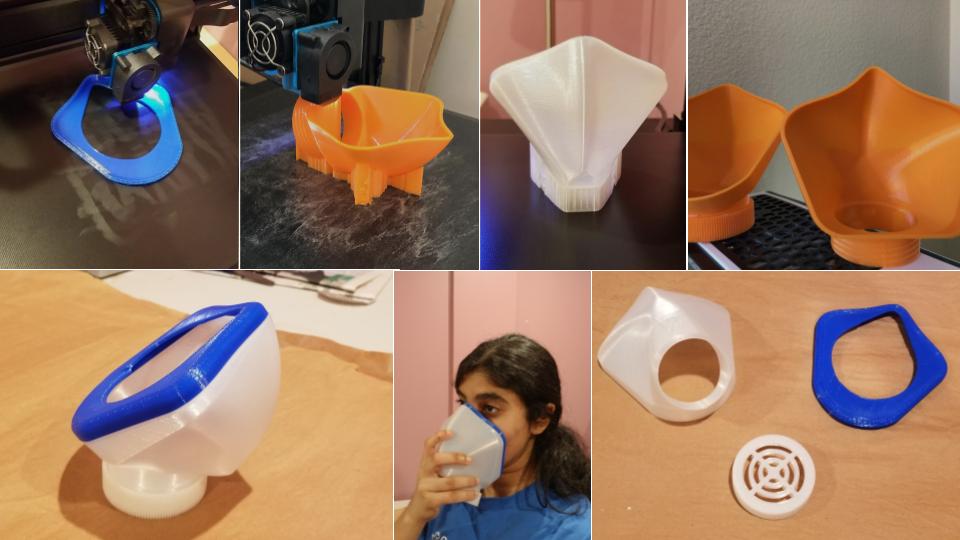Experiments in Social Distancing: STS alum interns virtually at Regeneron

As virtual Regeneron Science Talent Search finals week takes place this year, the Society had the pleasure of catching up with Science Talent Search 2019 alum, Preeti Krishnamani. During finals week last year in Washington D.C., the 19-year old heard about Regeneron’s robust internship program, an opportunity this year’s finalists will also learn more about tomorrow.
Now, a little over a year later, Preeti has earned herself a spot as a Therapeutic Area Project Management intern at the company, a program she is completing virtually. The MIT undergrad, a rising second year, is studying bioengineering and management and says she is thankful for experiences that have immersed her “in the healthcare space during this time of crisis, when the well-being of our society depends upon breakthroughs in biotechnology. As a Regeneron STS alumnus, having the opportunity to learn the inner workings of and contribute to innovation at Regeneron through my internship has allowed me to come full circle.”
If that weren’t impressive enough, apart from this internship, Preeti is also dedicating her time this summer to a separate project developing reusable respirators, funded by MIT’s Sandbox Innovation Fund. As COVID-19 numbers have begun surging again in some states, Preeti’s line of research remains critical as respirators must be in abundant supply for frontline workers and patients throughout the pandemic. Let’s learn more about Preeti’s research and what else she’s been up to below.
What is it like where you live right now, day to day?
While Delaware has reopened and essential workers are going on site, many others are working from home this summer and spending more time with their families. Since life and activity beyond the neighborhood has slowed down, it is great to see people in my community focusing on reenergizing and spending more time outdoors in nature.
How are you keeping busy during the COVID-19 world crisis?
My summer endeavors during the COVID pandemic have kept me constantly excited and on my toes! I am virtually interning at Regeneron in the Global Clinical Development group, helping to streamline and strategize clinical programs for various therapeutics in their pipeline. In my work, I collaborate with physicians, project managers and subject-matter experts in drug development on a daily basis.
Beyond my internship, in a separate project, I am also working with a team of engineers and physicians to develop reusable respirators for healthcare providers braving the COVID-19 pandemic. Our project has been awarded funding from MIT’s Sandbox program, which supports entrepreneurial ventures.

Have you participated in any relief efforts during the pandemic? Are you working on any projects?
Since returning home from MIT, I have been collaborating with Yatin Chandar – a fellow MIT student and ISEF alum – as well as my sister Pavitra Krishnamani, who is a physician at the Texas Medical Center, to develop low-cost reusable respirators for healthcare providers (HCPs) braving the COVID pandemic.
As an emergency medicine doctor, my sister lacks access to safe and reliable N95 respirators as her hospital quickly ran out of stock. Hence, she and her colleagues are forced to unsafely reuse disposable personal protective equipment (PPE) or seek out expensive reusable options on the market. With her face hidden behind an uncomfortable respirator, she also struggles to build trust and connect with her patients. Concerned for her and her fellow frontline workers’ safety, our team was motivated to create respirators that would both alleviate PPE shortages and meet HCP needs.
Together, we have designed a reusable respirator that leverages high-throughput manufacturing to reduce dire PPE shortages and keep HCPs safe. Through an MIT Sandbox program grant, we are prototyping our respirators, conducting market research to validate assumptions and scoping out launch paths to deliver our product quickly as well as positively impact healthcare providers on a large-scale.
Do you have any tips or suggestions for others who have recently been impacted by the coronavirus?
The COVID pandemic has underscored the value of a human life and the importance of caring about others. People are putting their lives on the line to save those whose lives hang in the balance. In this way, the COVID crisis is testing the strength of compassion and empathy in our society. So, I encourage you to connect meaningfully with people in your life, revive past connections and reflect on the human impact you create through your work, efforts and actions.
How are you keeping connected with the outside world?
Online gaming has allowed me to stay engaged and have fun with my friends! Since quarantine began, I’ve picked up playing Minecraft, Covidopoly and virtual card games with friends from college. Also, I often “zoom” with my friends from MIT’s Indian classical music group to practice and embark on new pieces together.
How do you think the textbooks will describe this point in history?
I think the COVID-19 crisis highlights both the breakthroughs and limitations in biology. Thanks to large-scale gene sequencing and analysis efforts, we have been able to pinpoint comorbidities of COVID. However, we still struggle to understand many of the fundamental aspects about how the coronavirus hijacks cells and why the disease appears to be heterogeneous in patients. Hence, this period in time will truly drive how fast the scientific community can learn and adapt to new biological problems affecting human health, agriculture and climate change.
Also, I believe that the COVID-19 crisis will change the way innovation occurs long into the future. Working at Regeneron this summer during the COVID-19 pandemic, I have seen companies, research institutions and nonprofits organize around this humanitarian challenge in extraordinary ways. These partnerships and collaborative approaches will only continue to drive innovation in our post-COVID-19 world.
More information of this year’s Regeneron STS finalists’ research projects and the winners award ceremony can be found here.


